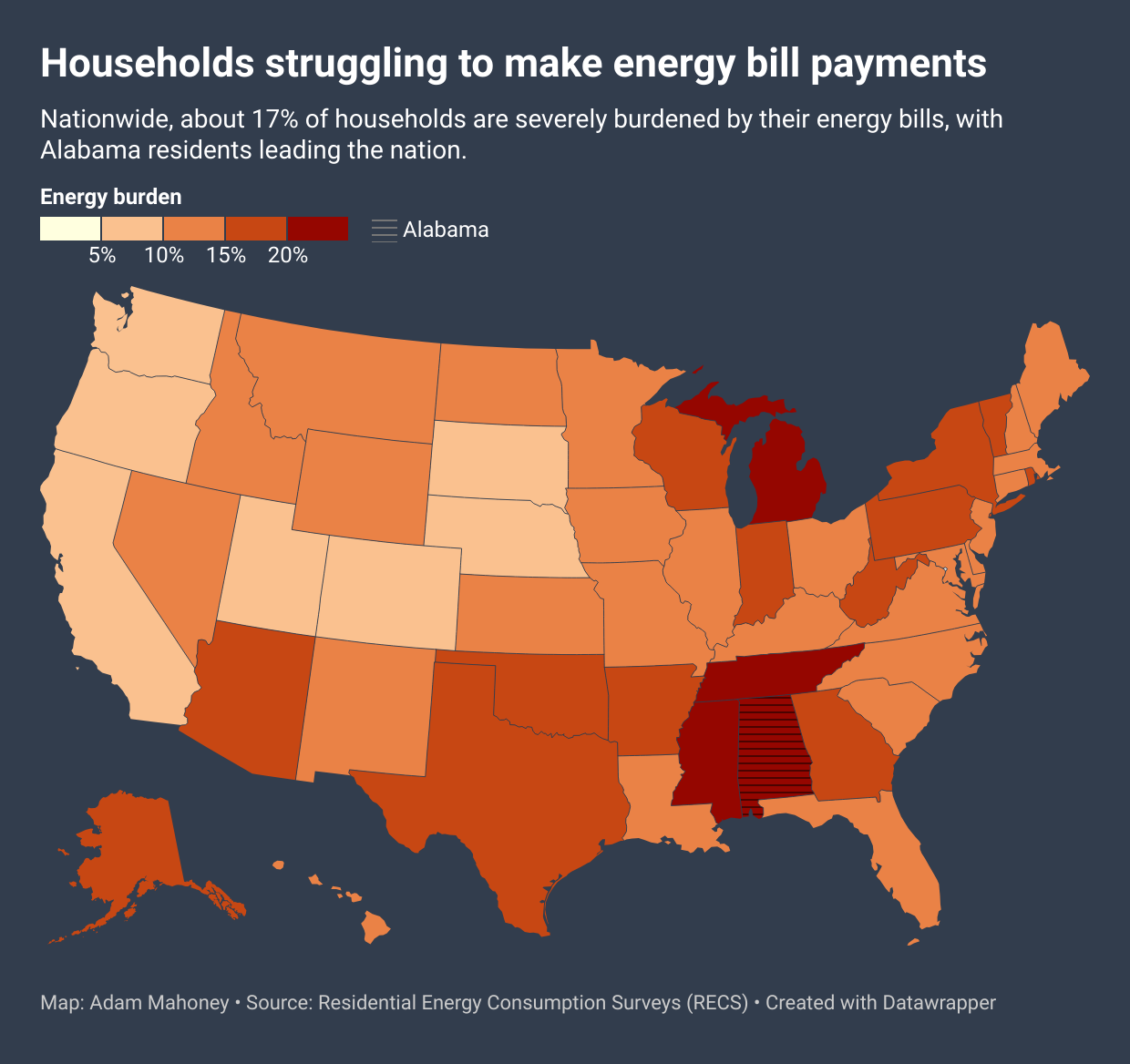
Illegal charging stations are powering Delhi’s e-rickshaw revolution
April 9, 2025
Acting IRS Chief Out Over ‘Unconscionable’ Deal to Share Taxpayer Data With ICE | Common Dreams
April 9, 2025When Chris Womack became the first Black CEO of Southern Co. in 2023, he called the company’s commitment to racial equity one of his guiding principles. His leadership of the third-largest private utility company in the world offered hope of fairer wages and more representative employment for thousands of Black employees and cleaner air and more reasonable energy bills for millions of Black customers across Georgia, Alabama, and Mississippi.
In recent years, he has routinely committed to racial equity.
“We cannot get distracted or deterred by divisive politics, or PR distractions that seek to use DEI as boogeyman language to scare, to frighten people,” he said at the American Association of Blacks in Energy National Conference in 2023. “We must defend DEI at every turn.”
And again, just four months ago, he said DEI was not a talking point for his company but something that was a part of the fabric of its work. “This work isn’t political,” he said.
Then came President Donald Trump.
Before Trump took office in January, Womack sent the incoming president a letter “with gratitude for [Trump’s] dedication to our nation and its citizens.”
He hoped the incoming president would “consider Southern Company, our subsidiaries, and our 28,000 employees as a partner and resource for you and your administration” and offered to “help [Trump] in any way.”
Within two months of sending that letter, Southern joined other major utilities serving the South in erasing their commitments to diversity, equity, and inclusion from their financial disclosures and websites. Dozens of pages of documents and website archives first shared with Capital B by the Energy and Policy Institute, a nonprofit watchdog organization focused on misinformation by fossil fuel and utility companies, paint a grim picture.
According to the watchdog group’s review of these companies’ website archives and public Securities and Exchange Commission filings, these rollbacks include scrapping workforce diversity goals, erasing partnerships with HBCUs, and abandoning community investments. At the same time, some of these utility companies are lobbying to weaken environmental regulations that make it easier for Black communities to breathe clean air, but have cost U.S. businesses about $380 billion in direct and indirect costs.
For millions of Black customers across the 14 states where these companies primarily operate, the consequences could be devastating. This retreat signals a betrayal of promises made during the racial justice reckoning of 2020 and a return to a “profit-driven calculus” that simplifies Black customers to revenue streams rather than stakeholders, customers and advocates told Capital B.
“We get distracted by what Trump is doing and saying, but these smaller places are pulling things from beneath our feet, too.”
Esther Calhoun, Alabama Power customer
In total, seven of the largest utility providers across the South have rolled back their diversity measures. For this story, Capital B focused on five of these companies — Ameren, CenterPoint Energy, Duke Energy, Dominion Energy, and Southern. We contacted every company mentioned in this article, but only Southern, CenterPoint, and Ameren acknowledged the requests. Ameren was the only company to offer a response.
When DEI programs vanish, so do the mentorships for Black engineers, the goals for hiring Black and brown workers, and the internal advocacy against discriminatory rate hikes that leave households choosing between food, medicine, and electricity.
The message is clear, said Shelby Green, a researcher at the Energy and Policy Institute: “Black lives mattered, briefly, as a marketing strategy.”
“We can’t rely on the generosity of corporations to uplift our own communities because it’s temporary,” she said.
The situation is more dire because many of these utility companies, which cover a larger share of Black residents than elsewhere in the country, operate as government-granted monopolies. This means customers have no alternative providers to turn to, leaving them entirely dependent on a company that might prioritize profits over affordability and community well-being without fear of competition.
It comes as the Trump administration abruptly laid off the entire staff running a $4.1 billion program that helps over 6 million struggling families pay their utility bills. With the end of the department running the Low Income Home Energy Assistance Program, $378 million in summer cooling assistance is in danger since no one remains to distribute these already-approved funds to states. This is especially worrying as hotter summers due to climate change mean more people can’t afford to run air conditioning, risking a rise in heat-related illnesses and deaths.
Advocates told Capital B they believe utility companies might follow suit in ending their own programs to help low-income households.
Michael Malcom, a pastor and customer of Alabama Power, another one of Southern’s subsidiaries, said the scaling back of support for initiatives addressing Black inequality adds to the “pains and cries of the people” in Alabama, where residents spend more on electricity than anywhere else in the nation.
In 2020, Southern acknowledged this disproportionate energy burden on Black and brown communities and vowed to address it. “They made a very, very big to-do about this. They said they were specifically going to push policy, not just energy policy, but policy broadly that was anti-racist,” Green said.
After committing $200 million to social justice causes following Floyd’s murder, including $100 million for HBCUs, Southern has removed these initiatives from its public materials, removed DEI language from its branding, and erased mentions of new goals for diversity within its workforce and community investments. The company also removed data tracking its racial diversity within the company.
They are “one of the most politically powerful and rich companies out there,” Green said. “They said they were going to take a stand — and they cowered.”
Read More:
For residents like Malcom, the rollbacks signal that their needs as customers won’t be valued or taken seriously. Nationwide, Black communities are already burdened by high energy costs and discriminatory practices. On average, Black households spend more of their monthly income on utility bills than any other group. In all, nearly 20% of Americans struggle to pay their monthly bills.
“The only thing that’s driving their actions is profit,” he said. “What has been done in the shadows is now being done in the light.”
Diversity goals dropped, bills keep rising
It is unclear if the diversity measures led to substantial improvements for workers and customers before they were scrapped. Only one of the companies, Southern, had a workforce that employed a representative number of Black workers. And across each of the states these companies serve, the energy burden for Black customers has remained much higher than for other ethnic groups, as every company has seen large monthly bill increases.
There is Ameren, which covers Missouri and came to prominence after committing to racial justice goals following Michael Brown’s killing in Ferguson in 2014. When the company introduced its broad diversity commitment that following year, its then-chief diversity officer, Sharon Harvey Davis, said supporting diversity “was a very easy thing to do.”
For its commitment to diversity in 2023, the company went as far as to give its executive leadership team monetary bonuses for reaching workforce diversity goals. At the time, leadership was 60% white and included only one Black employee. The year prior, ethnic minorities made up just 16% of the company’s workforce.
Yet, in recent months, the company has eliminated its DEI commitments entirely from its 2024 SEC filings, scrapping diversity goals, training programs, and employee resource groups.
In response to nine detailed questions posed to the company, Gwen Mizell, senior vice president and chief sustainability officer, said in a written statement that the company “has always been and remains 100 percent committed to being an equal opportunity employer” and “facilitating economic development for the communities we serve.” Since Trump took office, her title has shifted from “chief sustainability, diversity, & philanthropy officer” to “chief sustainability officer.”
Seemingly acknowledging the political shift around support for diversity measures, Mizell added, “Understanding and responding to the needs of a changing environment is critical to any sustainable business.”
As for the company’s day-to-day, in recent years, Ameren’s bill increases have outpaced both national inflation and local wages, with the average bill increasing by around 20% between 2020 and 2023. This comes as 166,000 of the company’s customers are behind on their electric bills.
Then there is Duke Energy, the sixth-largest private utility in the world, which followed suit by dropping HBCU partnerships and diversity targets from its reports. (The company still donates to community colleges, but no longer includes HBCUs.) At the same time, the company has actively lobbied to weaken environmental regulations for carbon and coal ash pollution, which disproportionately harms Black Americans’ health.
CenterPoint Energy, which covers residents from Minnesota to Texas, has also removed mentions of DEI from its public documents. After routinely quoting Martin Luther King Jr. in its press releases following Floyd’s murder, the company now funds politicians pushing voter suppression laws and lobbies against safer and more energy efficient household appliances. (CenterPoint, which Capital B has covered before, did not respond to requests for comment.)
Nekima Levy Armstrong, a civil rights lawyer and CenterPoint customer in Minnesota, has called for consumers to use their “buying power as a collective.” In Minnesota, she organized a boycott against Target, the store chain, for its removal of DEI programs.
“We have to pay our bills to keep the lights on, but what if we decided to send our bills back with a note saying, ‘reinstate your Diversity Equity and Inclusion policies,’” she said. “I think remaining silent in the face of these issues is not an option for struggling Black customers.”
There is also Dominion Energy, which covers the Carolinas and Virginia and proudly touted its 40% diverse workforce goal but scrapped the initiative before it took root.
“They had supplier diversification goals. … Their goal was by 2025, 20% of their total procurement would be spent on diverse suppliers,” explained Green, the researcher who is also a Dominion customer. Initially, Dominion showed progress — 12% one year, 13.5% the next — but by 2023, progress stagnated at 16.9%.
For customers frustrated by these rollbacks, Green suggested practical steps to reduce reliance on monopoly utilities: unplug unused appliances, invest in energy-efficient upgrades, and consider solar applications if possible.
“One less kilowatt-hour you’re giving to a monopoly utility is one less dollar supporting their bottom line,” she advised.
Green also emphasized reinvesting in Black businesses and communities as a form of resistance. “Unfortunately, you can’t do that with a monopoly utility if you want to keep your lights on.”
Black communities bear brunt of utility policies
Major private companies in the U.S. are rolling back diversity measures, primarily due to political pressure from the Trump administration’s executive orders targeting DEI programs. Conservative activists have also mounted campaigns against these initiatives, falsely claiming diversity programs are forms of “anti-white racism.”
Some companies have pointed to tighter budgets as the U.S. faces an economic downturn, claiming it is difficult to measure how diversity programs affect their bottom line. Some businesses are moving resources away from DEI and toward areas they see as more profitable, such as technology and day-to-day operations.
There is a tension utilities face between responding to customers and employees versus political stakeholders, explained Daniel Tait, the former executive director of Energy Alabama, a clean energy advocacy group. “There’s basically a pull between who do we respond to — our customers and our employees — or our political overlords?” he said.
But, dismantling these programs raises urgent questions about corporate accountability in an era where monopolistic utilities often hold unchecked power over vulnerable communities. Across Alabama, for example, Southern is the most expensive power provider and faces virtually no other competition. Experts said diversity measures were among the few ways workers and customers could keep these companies accountable.
Black people are most likely to live near utility companies’ power plants and face the highest risks of death from them, yet they rarely see benefits like jobs or community investments, experts said. Despite Black people making up a quarter of the South’s population, they are less than 10% of utility workers.

Most utilities operate as government-granted monopolies, where a single company has exclusive rights to provide electricity within a specific geographic area, with prices regulated by state commissions. This means customers cannot choose alternative providers, giving utilities significant power to influence rates, infrastructure decisions, and policies. Often, advocates said, this means these companies prioritize their profits over customer interests, affordability, and environmental concerns.
For example, Alabama Power, ranked among the worst utilities for energy efficiency in America, charges extra fees to customers who install solar panels. This practice is currently being challenged in federal court, as customers and environmental groups argue it is a tactic to unfairly discourage clean energy sources that are cheaper to run and would cut the company’s profits.
Additionally, Southern is extending the plant lives of coal plants near Black communities in Georgia and Mississippi, citing an increased need for electricity caused by artificial intelligence and data centers. Coal power plants are the worst power sources for the environment and human health.
Read More: America’s Digital Demand Threatens Black Communities with More Pollution
The three states where Southern primarily operates — Alabama, Georgia, and Mississippi — are among the top five states where Black people report struggling the most to pay their bills and experience the most electricity shut-offs.
“How are we expected to afford our food, our medicine, our car insurance, our cellphone, the internet? The average person I know makes $1,300 a month,” said Alabama Power customer Esther Calhoun. Her monthly bill to power her trailer home in rural Alabama now exceeds $300.
“The deep problem is, people don’t want us to come together as one,” she added about the company and larger initiatives to roll back diversity measures. “We get distracted by what Trump is doing and saying, but these smaller places are pulling things from beneath our feet, too.”
Great Job Adam Mahoney & the Team @ Capital B News Source link for sharing this story.






